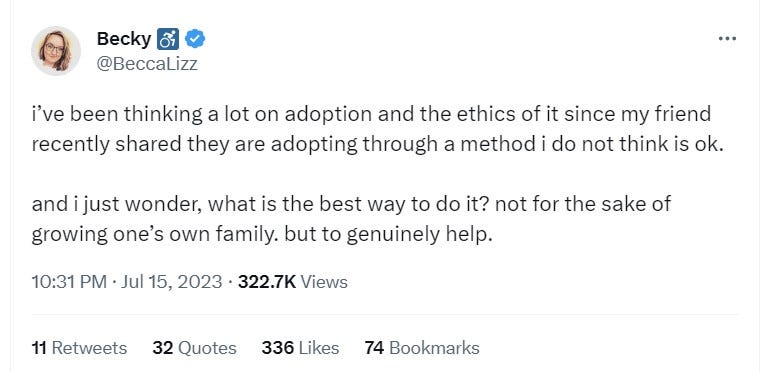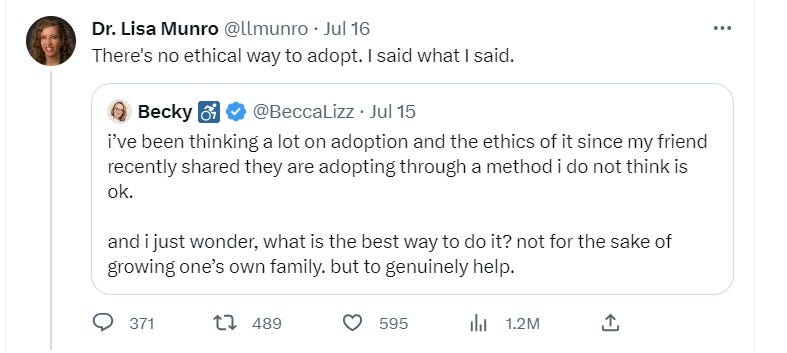If you want to enrage people on the internet, I know of no faster way than to criticize the practice of adoption on the internet. I have once again created a viral shitstorm on Twitter because I recently posted about my belief that adoption, as a system and practice, is unethical. (Of the total three tweets in my entire oeuvre that have now gone viral, two have been adoption-critical tweets and one was about academic reading skills, which is ???)
I swear that this was not my intention. I had been minding my own business, pretending to not be adopted and knowing even less about adoption politics when this gem came across my Twitter feed:
The OP had not allowed commenting on their post, but I felt compelled to say something so:
I’m not linking to anything here, but you can go find these tweets if you’re inclined. I left them up for people to read. I recommend not reading the comments on my tweet. People called me stupid, cruel, and told me to shut up. And those were probably the least offensive replies.
The usual suspects showed up:
people who want me to do the thinking for them (“Well, what’s the alternative then? What if a better system doesn’t exist?” as if human beings are not uniquely capable of inventing new things and systems)
adopted people who love being adopted who want to help me feel better about it
people who know adopted people who love being adopted or are “fine”
people beseeching me to think about “the orphans”
people who think I misunderstand adoption and want to explain it to me
people who think I misunderstand the idea of ethics and want to explain it to me
people sorry that I’m angry and ungrateful
adoptive and foster parents
random internet people who have said vile shit about and to me
Several accounts who replied to my tweet seemed blithely unaware that I’m also adopted and sought to educate me on the subject. When the comments turned really ugly, I muted the whole thread, leading to further vitriol because I refused to engage with people saying hateful things both to and about me. There’s no way to win at that point. (I’m doing okay, in case you’re wondering, but it never feels great to be the target of internet rage from total strangers.)
But Twitter is no place for nuance and exploration, which is why I am writing to you here. Why does saying that adoption is an unethical system trigger such intense outrage (particularly from random internet people who have no dogs in any adoption politics fights?). I know of no other subject that elicits this response. (Can you think of one? There’s a lot of moral outrage about all kind of things these days, but I am hard pressed to think of another system, institution, or practice that people so vehemently will defend in the face of even the mildest criticism. ETA to add that I did think of some other systems that people will vehemently defend when called out on it, which is white supremacy and patriarchy, which in turn are totally tied up with adoption politics, so there’s that.)
Here’s my theory:
Deep down, we know that adoption is morally wrong.
(I suppose in my original tweet, I should have said both unethical and immoral, but the OPs post was about someone she knew who was adopting in a way that she found unethical and I was responding to her language and I can only imagine that throwing in the idea of adoption as immoral would have generated even more outrage.)
I really think that the sheer outrage people express when I criticize adoption surfaces uncomfortable feelings of complicity in immoral systems, feelings mostly kept at bay through unwavering faith in the absolute goodness of adoption. People will say and do almost anything to relieve that deep sense of moral wrongness, including generating oceans of outrage. People will tie themselves in pretzels to justify and rationalize injustice, particularly when it involves adoption. I kind of get it. I mean, no one wants to feel implicated in unethical systems that hurt children.
People want me to relieve them of the burden of feeling morally wrong, which is why they are desperate for me to tell that it’s possible to ethically source children, that it’s okay, desirable even, to engage in systems fundamentally racist, classist, misogynist, ableist, and colonialist. Those systems move children from families that we (the big we) find socially unacceptable and moves them to families we find socially desirable to shape certain body politics around inequality and inequity.
We’re all complicit in these processes. We all contribute to collective understandings about who we think should have children and who shouldn’t have children and who should not raise their children and who should benefit from other people not raising their own children. Our beliefs about what makes some families producers of children for more desirable families don’t somehow exist in a vacuum, separate from the structural inequities that shape people’s lives.
Adoption isn’t “another way to grow a family” and it’s not just a personal, private decision that affects only a limited number of people. As the title of this newsletter tells you, I believe that adoption is a fundamentally political decision. It is a decision that supports injustices for some people while helping others accrue social and cultural capital granted through children acquired from someone else.
Lots of people want to tell me their personal stories of adoption to reject my argument that the entire premise and assumptions that surround our current adoption systems are oppressive and unethical. Individual stories do indeed matter, but in my own case, my thinking really shifted when I started seeing my own personal adoption story (which is not at all interesting—I could be any adopted kid in the 1970s) as a small part of a much larger story of structural injustice that spans the globe.
So what’s unethical about adoption? Here are some things I find unethical (not an exhaustive list but this post is already getting long).
state sponsored family policing systems that target people of color for child removal
coercive adoption practices (see: crisis pregnancy centers, adoption professionals, maternity homes, potential adoptive parents, “pre-matching”, money—the number of people who believe that relinquishment of children is somehow free of coercion and is a freely made choice is WILD)
international adoption practices that turn into child trafficking rackets (see in particular Guatemala, but anywhere that child adoption becomes popular and profitable and corrupt)
states that seal adoption records and information from adopted people themselves
adoption fundraisers (as I’ve often said, adoption fundraisers are for people who can’t afford to adopt children from people who they don’t think should have children they can’t afford)
money in adoption systems (yes, many adoption agencies are non-profit but that’s a tax designation and doesn’t change the way that money commodifies children and creates market systems for human children)
adoptive parents profiting from sharing their adopted children’s private stories online
baby boxes
putative father registries that no one knows about
rehoming children on Facebook
orphanages (lots of people seem to think I am in favor of them when in fact I wish to abolish them too)
state-sponsored family separations of any kind
Under the current premises of adoption, I don’t think there’s an ethical way to determine whose family gets slated for destruction so that another can benefit. How do we ethically decide which children are “adoptable”? How do we decide ethically which parents deserve children? When is someone’s desire to parent someone else’s children greater than our interests in supporting families in crisis? How do we care for children in a way that doesn’t reproduce our own biases and structural inequities? Why do we find it so impossible to believe that poor parents can be good parents and that somehow middle-classness imbues people with superior parenting skills? (Do you know any middle class parents who are terrible parents? Me too. Also, none of the middle class moms I know who get high at night after the kids have gone to bed are ever the targets of CPS investigations.)
I understand that for many people unfamiliar with adoption as a system and practice, the ideas I espouse might seem shocking. If it’s the first time you’ve come across an adoption-critical perspective, it might seem offensive. You might feel angry. It takes time to let go of the knee-jerk defensiveness and really hear what I’m saying (and the other people who share my perspective—there are more of them than you’d think). Try muting the outrage and thinking about why adoption might not be the problem free solution to solve social problems that you might have believed.
Plenty of people have told me that I’m a horrible person for even suggesting that there’s anything wrong with adoption. I didn’t come to my present position without a lot of thought and consideration. I estimate that I’ve been thinking about, researching, and writing about adoption politics in some form for the better part of ten years. If you’d asked me fifteen years ago if I even thought about adoption, I would have said no, and if I did, that I thought it was great. Slowly, slowly, my perspective has shifted towards one that can’t accept current adoption assumptions and resulting practices as ethical or moral.
I advocate for the things I advocate for online because I want us (the big US) to radically rethink how we care for families and children, not because I find it personally gratifying to be the target of online outrage from thousands of strangers. In 100 years, I hope that people look back to twentieth century adoption practices and the assumptions that inform them with a sense of shock that we treated so many people so poorly. I want us to do better by the people we have hurt through adoption practices. I want us to invent more humane systems that respect children’s rights and recognize that they have a right to their families that
outweighs a stranger’s desire to parent them. I want us to create truly child-centered practices that seek solutions to children’s actual problems, rather than solving the problems of the adults around them.
I want us to create a new ethics of care for children, not debate whether its possible to ethically source children.





I saw the shitshow and felt so bad for you. I can't understand how the woman who wrote the original tweet about "ethically sourced" children didn't read that to herself and think about what she was saying. IMHO most of the bad stuff about adoption is right out in the open like that and the primary job of adoptees is to pretend it's not true so adoption can continue.
Also, screw Becky with the Good Hair and her righteousness.